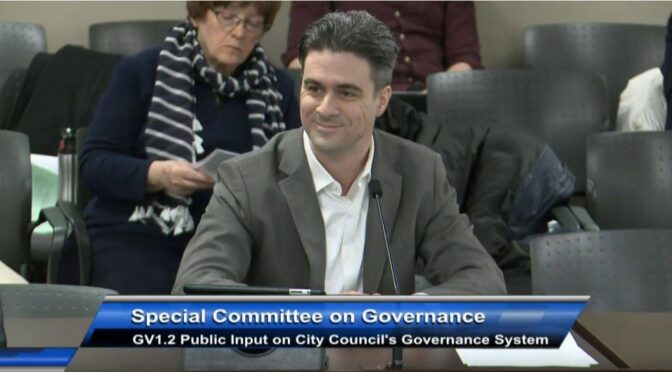On Feb 21, 2019 I spoke at the city’s Special Committee on Governance, which was formed to take public input on how to govern Toronto now that Ford abruptly slashed council in half mid-election, and also to discuss Councillor Bradford’s motion to institute term limits. The committee has five councillors: Perks, Carroll, Holyday, Crawford, and Bailão .
After being one of hundreds of election candidates burned by Ford’s meddling I decided this was my chance to really speak to the issue. I wrote a scathing critique of Ford’s flailing destabilizing version of ideologically-driven governance, while also jamming in all my thoughts on improving democracy in Toronto, including my opposition to term limits. It makes for a lively rant:
I am truly baffled by Councillor Holyday’s senseless interjection of “stick on point with governance”. How can we have a discussion on governance and completely leave out any mention of the man who unilaterally changed our governance with no consultation, and without whose actions the committee would not even exist? And why wouldn’t we address that elephant in the room seeing as he has the power to negate any decisions that committee tries to make?
The question I will be asking the committee is whether or not they intend to pursue some kind of higher level autonomy for Toronto, like a charter city, or are they only mandated (or willing) to work within the confines of the existing power structure?
Here’s a clip of the Q&A after my speech:
The very next week there was an excellent event on the very topic of Toronto’s governance held by Why Should I Care?. Former Mayor John Sewell and former CBC journalist Doug Earl were there, representing the group Charter City Toronto. They believe the way forward is to find a willing provincial partner to use Section 43 of the Constitution, although at a glance it’s not clear how this will apply. They say it’s been used by provinces successfully before, however the catch is it requires a cooperative provincial government. Something we are in short supply of, and my fear is the Ontario Liberals might run on such a notion next election to woo urban votes, but just like the federal Liberals’ false promise of electoral reform, they will renege once in power. Toronto’s tax revenues are too lucrative to cede us control over our own affairs.
It seems Calgary, Edmonton, and Vancouver all have charters, but they were done in cooperation with their province and haven’t involved the feds in any way, so they are still vulnerable to provincial meddling should a province decide to rescind or alter the charter. Also, Calgary and Edmonton didn’t receive any additional taxation powers, and Vancouver’s charter seems similar to the City of Toronto Act, basically just making an exception out of the largest city and provincial capital to have some powers other municipalities don’t, however it does seem to be the most independent of all Canadian cities. A great article details much of this history.
Ford has made it clear we need more than provincial laws that can be unilaterally changed to impose whims upon any municipality that a premier disdains. The constitution calls for changes requiring authorizations by:
- “(a) resolutions of the Senate and House of Commons; and
- (b) resolutions of the legislative assemblies of at least two-thirds of the provinces that have, in the aggregate, according to the then latest general census, at least fifty per cent of the population of all the provinces.”
Well, if you take all the biggest cities in every province that MORE than qualifies. Now, imagine if those cities banded together in a Municipal Sovereignty Movement to pressure the feds to make cities part of the constitution? Under the current proclamation (it must be understood, both versions of the constitution were unilaterally imposed by governments, people had no say) we would still need the “legislative assemblies of the provinces” to agree, but if pressure starts to come from all cities across all provinces at once… If this idea takes off who knows which parties will adopt it in their platform to win urban votes, and which new parties might even spring up focused on that goal?
These discussions have the potential to alter Toronto’s power dynamic moving forward. I encourage residents to follow the Special Committee on Governance, email them to sign up for updates ([email protected]), and follow and join groups like Charter City Toronto and Defend Toronto.

